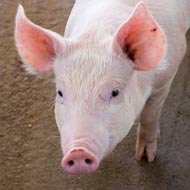New guidelines to prevent pig tail docking

Under the new recommendation, enrichment materials are classified as 'optimal', 'suboptimal' and 'of marginal interest'.
The European Commission (EC) has published new best practice guidelines to help reduce the need for tail docking in pigs.
The practice of tail docking is carried out to prevent tail biting - an abnormal behaviour with multi-factorial causes.
EU legislation requires member countries to ensure tail docking is not carried out routinely, but only when there is evidence of injuries to sows' teats or other pigs' ears or tails. British producers are required to reduce the need to tail dock by making adjustments to the environment and husbandry.
The recommendation has been released at the same time as a paper on best practice in providing enrichment materials to prevent tail biting.
Both papers have been produced in response to a drive by animal welfare organisations to ensure member states adhere to pig welfare rules. There are also concerns that husbandry systems differ between member states, meaning there is a need for best practice advice.
Under the new recommendation, enrichment materials are classified as 'optimal', 'suboptimal' and 'of marginal interest'. Suboptimal materials should be used in combination with other materials, while those of marginal interest are likely to provide distraction for pigs, but must be used with optimal or suboptimal materials.
Farmers should carry out a tail biting risk assessment, according to the recommendation. This should take into account: enrichment materials provided, cleanliness, thermal comfort and air quality, health status, competition for food and space and diet.
Based on this assessment, farmers should consider making any relevant changes, such as providing enrichment materials, comfortable environmental conditions, assuring good health status and/or providing a balanced diet.
The UK's National Pig Association says it will discuss the paper with Defra to ensure the government's response takes into account the multifactorial causes of tail-biting.
For more information, see: http://eur-lex.europa.eu/legal-content/EN/TXT/?uri=CELEX%3A32016H0336



 The latest
The latest